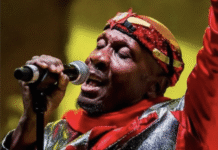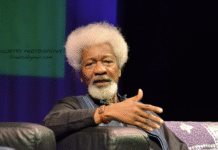
by Nsenga K. Burton, Ph.D.
If you’re familiar with the term, “Renaissance Man,” then the name Paul Robeson is not news to you. The son of an escaped United States slave, Robeson was a tremendous athlete, scholar, activist and performer whose radical beliefs contributed to his being marginalized in the acting and political arenas. Before being persecuted by the United States government, Robeson starred in plays and films written, produced and directed by black and white filmmakers, which was exceptional at the time. In 1925, Robeson starred in African-American film pioneer Oscar Micheaux’s Body and Soul. Robeson played the dual-role of a corrupt preacher and the upstanding gentleman who was the preacher’s brother, reflecting to some extent his friend W.E.B. DuBois’ philosophy about double consciousness. PBS.org writes:
Born in 1898, Paul Robeson grew up in Princeton, New Jersey. His father had escaped slavery and become a Presbyterian minister, while his mother was from a distinguished Philadelphia family. At seventeen, he was given a scholarship to Rutgers University, where he received an unprecedented twelve major letters in four years and was his class valedictorian. After graduating he went on to Columbia University Law School, and, in the early 1920s, took a job with a New York law firm. Racial strife at the firm ended Robeson’s career as a lawyer early, but he was soon to find an appreciative home for his talents.
Returning to his love of public speaking, Robeson began to find work as an actor. In the mid-1920s he played the lead in Eugene O’Neill’s “All God’s Chillun Got Wings” (1924) and “The Emperor Jones” (1925). Throughout the late 1920s and 1930s, he was a widely acclaimed actor and singer. With songs such as his trademark “Ol’ Man River,” he became one of the most popular concert singers of his time. His “Othello” was the longest-running Shakespeare play in Broadway history, running for nearly three hundred performances. It is still considered one of the great-American Shakespeare productions. While his fame grew in the United States, he became equally well-loved internationally. He spoke fifteen languages, and performed benefits throughout the world for causes of social justice. More than any other performer of his time, he believed that the famous have a responsibility to fight for justice and peace.
As an actor, Robeson was one of the first black men to play serious roles in the primarily white American theater. He performed in a number of films as well, including a re-make of “The Emperor Jones” (1933) and “Song of Freedom” (1936). In a time of deeply entrenched racism, he continually struggled for further understanding of cultural difference. At the height of his popularity, Robeson was a national symbol and a cultural leader in the war against fascism abroad and racism at home. He was admired and befriended by both the general public and prominent personalities, including Eleanor Roosevelt, W.E.B. Du Bois, Joe Louis, Pablo Neruda, Lena Horne, and Harry Truman. While his varied talents and his outspoken defense of civil liberties brought him many admirers, it also made him enemies among conservatives trying to maintain the status quo.
During the 1940s, Robeson’s black nationalist and anti-colonialist activities brought him to the attention of Senator Joseph McCarthy. Despite his contributions as an entertainer to the Allied forces during World War II, Robeson was singled out as a major threat to American democracy. Every attempt was made to silence and discredit him, and in 1950 the persecution reached a climax when his passport was revoked. He could no longer travel abroad to perform, and his career was stifled. Of this time, Lloyd Brown, a writer and long-time colleague of Robeson, states: “Paul Robeson was the most persecuted, the most ostracized, the most condemned black man in America, then or ever.”
It was eight years before his passport was reinstated. A weary and triumphant Robeson began again to travel and give concerts in England and Australia. But the years of hardship had taken their toll. After several bouts of depression, he was admitted to a hospital in London, where he was administered continued shock treatments. When Robeson returned to the United States in 1963, he was misdiagnosed several times and treated for a variety of physical and psychological problems. Realizing that he was no longer the powerful singer or agile orator of his prime, he decided to step out of the public eye. He retired to Philadelphia and lived in self-imposed seclusion until his death in 1976.
Robeson died on January 23 from complications from a stroke. His body lay in state at the historic Mother A.M.E. Zion church in Harlem.
Carlyle Douglas of Ebony Magazine wrote the following:
Among the thousands who crowded into the historic sanctuary were faces from the old Harlem Writers Guild, the old Left and others who were just old…For Harry Belafonte, one of the handful of celebrities who braved the rain that night, ‘An important piece of black American History ended with Paul.’ Belafonte met Robeson in the years after WWII when Harry was part of a Harlem group called the Committee for the Negro in the Arts. A $500 contribution from Robeson helped get the organization started. ‘If there had been no Paul Robeson,’ said Harry Belafonte, ‘There would be no me.’
Other attendees included civil rights activist and labor organizer A. Phillip Randolph. Robeson was 77.
Read more at PBS.org.
Like The Burton Wire on Facebook. Follow us on Twitter @TheBurtonWire.








